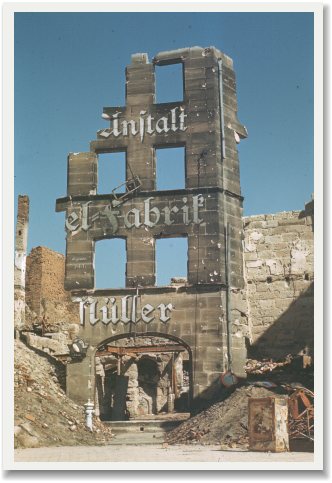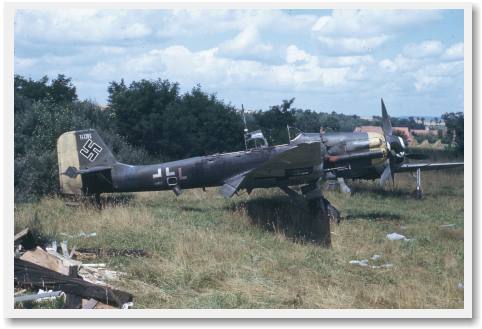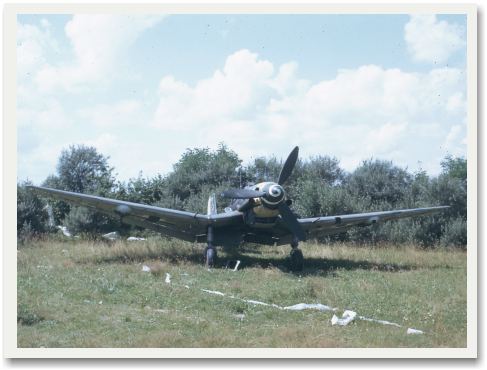Part XIV
The "Great Day" arrived and the Thirty Fourth was in residence at Haguenau, France on the immediate Alsatian/German border just west of the Rhine River when the surrender of the German Forces in Europe was announced and became effective, 8 May 1945. The squadron to a man, accepted "V-E Day" quite calmly--there was little or no jubilance displayed--each preferred to go in his own direction and "reflect" in his own way. It did happen.

Postwar Germany...the devastation was total. (Richard Kill) Hostilities had ended but 34th operations went on. In fact, the 34th Photo Squadron was destined to be one of the last, if not the last, squadrons operational in Europe. Right up to the end it collected heretofore unavailable European photography--much of it in the western "Iron Curtain" countries. 34th priority photography taken at that time of command, control and communication centers, in particular, would remain in demand by the United States Intelligence Community for years to come. For several days just following "V-E Day" itself squadron pilots flew mapping and bomb damage assessment missions over Hungary, Poland, Czecho-Slovakia and Jugo Slavia. It was soon obvious that several hadn't gotten the message--at least, they were a bit "touchy" about over-flying their air space. Yes, anti-aircraft fire, much of it damn accurate, was reported by all pilots--the "conquered" were certainly doing more than just clearing their guns.
Although still operational the schedule was now a more normal one--even had weekends off. On a rotational basis squadron personnel were off in all directions to see Europe--and the first group of "high pointers" was leaving for the good old USA--included were dear Ole' "Pappy" Trout, Ted Langfinger and, of course, "Private" Pop Kerr. Just before departing "Pop" hollered out, "where's Colonel Hayes?....I've got to say goodbye". (I was there and we said goodbye, but none of us have seen or heard from him since--"where are you "Pop", how about giving me another chance?"
Too, just about all of the original pilots had returned to the ZI--the replacement pilots all had been carrying the load for sometime now and without exception, doing one helluva fine job. Wallace Bosworth, John Sanders, Garland York and Allen Keith, our youngest, were about the last of the original to go--believe me, they returned home four seasoned-veterans.
Bob Jarrell and Jim Dempsey had also returned stateside to stay. Bob had taken command of the squadron at a most critical time--the heart of winter when conditions were at their worst. He had his hands full while ruling the roost but performed like the professional he was--the record amply reflects it. His was a tremendous effort. "Demps" returned to get his master's degree in Aeronautical Engineering and go on to become President and Chief Operating Officer of Convair Astronautics, where he headed-up the Atlas missile program in San Diego. (Thanks, again, "Demps", for your hospitality and expert advice given me and my people in 1959. Our comparative analysis studies--resulting from the application of American missile production techniques and patterns provided by your specialists--turned out to be the initial "breakthrough" for identifying and assessing early Russian missile production capabilities).
After a couple of quick post/war missions over East Berlin and Jugo Slavia--yes, they were still lobbing "iron" our way--I, too, took off for a few days rest on the Riviera. It was great--seven days to bask in the sun on the shores of the Mediterranean and "reflect" on the past year and a half. And seven nights at the Martinez Hotel in Cannes, France to listen to the Air Corps Glen Miller band at its best--"Moonlight Serenade", "Symphony", "Dreams" and Sentimental Journey"--it all helped to formulate a decision or two for the future. Rested and reborn, I returned to Haguenau and moved quickly to Nurembourg to wind up my European tour as Commander of the Tenth Reconnaissance Group.
In the meantime the 34th continued flying its operational missions over Central and Eastern Europe. Several nations particularly, the "Iron Curtain" countries, became somewhat disenchanted with these over-flights of their airspace and initiated the necessary steps to have them terminated. Although somewhat restrained, however, we did remain in business. it was then that the 34th experienced its first "escape/evasion" mission of the war--"hot or cold". Flight Officer Robert Rankin (nephew of the famed American aviation pioneer, "Tex" Rankin) was forced down just behind the "Iron Curtain". He was immediately imprisoned in a make-shift jail which he quite "conveniently" broke out of. With the aid of a feminine companion (at the time, seemingly quite well positioned) he completed his escape, via a street car from one side of the city to the other back to the US zone and safety. (Actually, the entire escape scenario was just that--it really had the "Hollywood flare" and could easily have been one of convenience to save "certain people", "certain embarrassment"--could the 34th have kicked-off the "Cold War", too?)

On 8-May, 1945 this Junkers Ju 87 D, (W.Nr. 141286) of Nachtschlagtgruppe NSGr.10, landed at F�rth to surrender to the Americans. Seen here, it's been pushed aside and partially parted. Note the Focke Wulf Fw 190 A-8 which is parked beside it. (Richard Kill) Everything had just about come to a stop and the 34th was preparing for its final move. On 16 July 1945 it rolled into R-28 Furth/Nurembourg, Germany for its final European "landing". Thanks once again to the "Unsung Bunch" it had literally left the French a "gold mine" at Haguenau--completely rehabilitated living quarters with hot and cold running water, glass window panes throughout, even furniture made for quite a "Country Club" atmosphere. An air depot complex on the hangar line was also sure to make someone happy. In fact one hangar was now a well-supplied machine shop complete with drill presses, lathes and electric motors--all from Germany. C'est la guerre.
Furth/Nurembourg was equally a "Country Club" and did serve as a fitting "resting place" for the Thirty Fourth. This airdrome was the best of all. Everything was intact--individual living quarters, three to four a room, with hot showers and toilets on each floor. The hangars were all fully equipped. Everything to make our final days a bit more pleasant.
One of those days turned out mighty pleasant for Joe Santelli, the 34th's master of the keyboard and "ex-hypo splasher" from the photo lab. He left the squadron to tour the ETO with the Jane Froman USO troupe. His "big chance" came while Joe was giving one of his weekly piano recitals at the Red Cross Club in Furth. Minus a pianist-accompanist, Jane heard Joe and grabbed him up immediately. In addition to accompanying Miss Froman he was also a feature soloist on the program. I assure you the 34th's loss was certainly Jane Froman's gain--Joe was a top professional, too.

Another view of W.Nr. 141286 at F�rth. In the original (pre-cropped) image, you could see the pitot/static tube of the Focke Wulf Fw 190 A-8 parked immediately to the left. Records suggest this a/c may have been one of several Fw's that also surrendered on 8-May from I/JG 6. (Richard Kill) For the next four months the 34th continued to fly photography missions of all sorts--using F-5's, A- 26's and finally the Canadian "Bush" plane--the Norden Norseman. But the "last days" were definitely closing in. I guess we could say that the dying gasps were near when "stringer charges" were strapped about the engines and the tail assemblies of our beloved F-5's and then "discharged"--it was a pitiful looking lot. Although it may have been the "Crucifixion" it was not the end.
